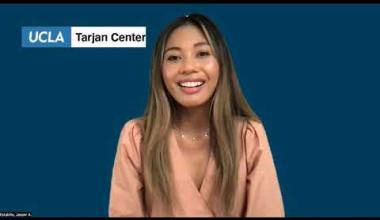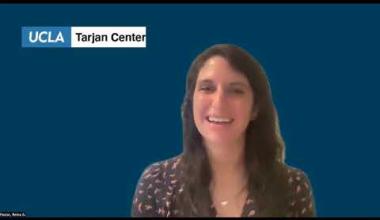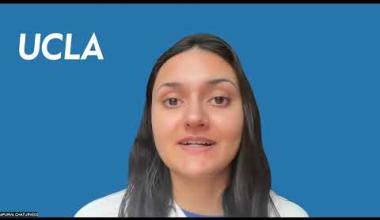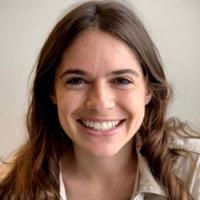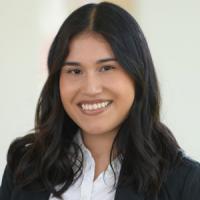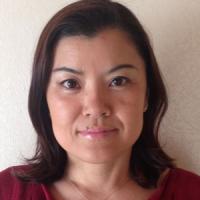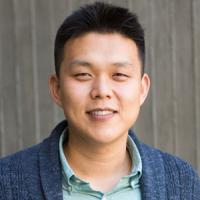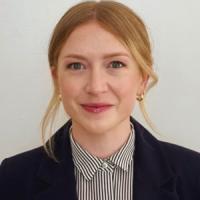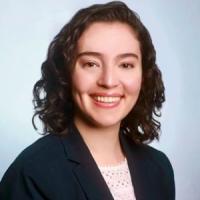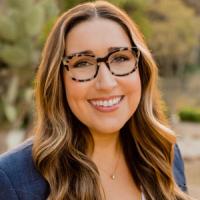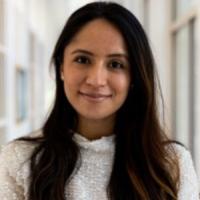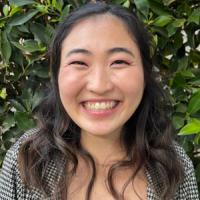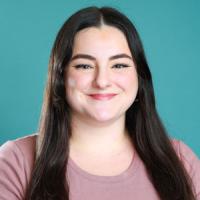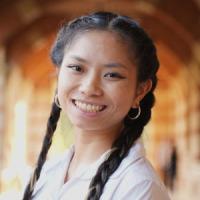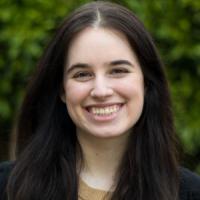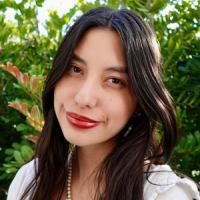Trainees at the Tarjan Center
One of the Tarjan Center's chief activities is the preparation of personnel for careers in fields relating to developmental disabilities. Because the needs of individuals with developmental disabilities are complex, service providers and professionals require expertise in many different disciplines. Our faculty and trainees follow an interdisciplinary approach and provide state of the art diagnosis, evaluation, and treatment services through UCLA-based Tarjan Center Clinical Training & Services. We welcome our new trainees for 2021-2022. For information about our training program contact our Director of Training, Dr. Jasper Estabillo at jestabillo@mednet.ucla.edu
UCLA Nursing Doctoral Student
Fellow, Golisano Institute of Developmental Disability Nursing
Cherisse Watts is a doctoral student in the School of Nursing at University of California Los Angeles, and a graduate of Wellesley College and Charles Drew University of Medicine and Science. Her research interests include investigating health disparities and improving quality of care among Black and Latinx children. Her research efforts are concentrated on advocating for medically underserved and low-income families of children with intellectual and developmental disabilities (IDD) and ensuring that they have access to resources needed to achieve optimal health.
Cherisse participates in IDD research with her advisor, Dr. Lauren Clark, Professor and Shapiro Endowed Chair for... more
Dr. Nurit Benrey is a postdoctoral scholar in the Lord Lab. She received her PhD in Clinical Psychology with a Health Emphasis from Ferkauf Graduate School of Psychology. She has extensive experiencing working with neurodiverse youth and adults across a variety of clinical and research settings. In terms of research, Nurit has utilized single-channel VEP recordings to advance understanding of the neural differences in autism. Nurit is also passionate about contributing to the Tarjan Center’s mission of advancing the self-determination, inclusion, and quality of life of neurodiverse people and their families.
Giselle Salinas, Ph.D. is a postdoctoral fellow at the UCLA Semel Institute for Neuroscience and Human Behavior in the Program for Education Enrichment of Relational Skills (PEERS®) Clinic and the Tarjan Center. Dr. Salinas earned her doctorate in special education at UC Riverside, where she studied the high school transition planning experiences of autistic adults and/or intellectual disability (ID) and their parents. As a graduate student, Dr. Salinas worked closely with Spanish-speaking families at a free autism screening clinic, where she guided families in special education advocacy and autism assessments. Her research interests revolve around the transition to adulthood for young... more
Yuriko Matsuo (Yuri) is a third-year doctoral student at the UCLA School of Nursing. She received her BSN and MSN from the University of Pennsylvania. She has experience working as a psychiatric nurse practitioner in a crisis service for pediatrics. Her research interests lie in the adulthood of individuals with intellectual and developmental disabilities (IDD), with a special focus on Down syndrome and their family caregivers, in their mental health, Alzheimer’s disease dementia, and quality of life.
Yuri participates in IDD research with her advisor, Dr. Lauren Clark, Professor and Shapiro Endowed Chair for Developmental Disability Studies at UCLA. Projects include the... more
Dr. James Yang is a postdoctoral scholar at the UCLA Semel Institute for Neuroscience and Human Behavior in the Program for Education Enrichment of Relational Skills (PEERS®) Clinic. He earned his doctorate in Human Development and Psychology from UCLA’s School of Education and Information Studies. As a graduate student, he studied the employment and post-secondary education attainment of high school students with autism in addition to training teachers to implement the Self-Determined Learning Model of Instruction (SDLMI). His research interests include further understanding the role of adaptive functioning skills and self-determination on employment and educational outcomes of... more
Elsa Cincione is a Clinical Psychology Intern in the Autism and Neurodevelopmental Disabilities Treatment Track at the UCLA Semel Institute for Neuroscience and Human Behavior. She is also a PsyD candidate at the PGSP-Stanford Consortium, where she completed training and research in the Stanford Autism Center. In addition to her work in the Tarjan Center at UCLA, Elsa is involved with the Program for the Education and Enrichment of Relational Skills (PEERS™), the Child and Adult Neurodevelopmental (CAN) Clinic, and the Parent-Child Interaction Therapy Clinic. Elsa is passionate about supporting self-advocates and her research revolves around enhancing and supporting problem-solving and... more
Samara Wolpe is a practicum student in PEERS®. She is a PhD candidate at UCLA studying under the mentorship of Dr. Jeffrey Wood, and was a UC Leadership Education and Neurodevelopment and Related Disabilities (LEND) trainee. Samara is a PEERS® Certified provider with experience working with PEERS® for teens and young adults, an Educational Psychologist for autistic and neurodivergent teens and young adults, and a published researcher who advocates for neurodiversity-forward, community partnership based research in the autistic community. Samara is passionate about improving outcomes in employment, education, social and emotional welfare, and quality of life in autistic adults.
Dr. Blake Warner (he/him) is a postdoctoral fellow at the UCLA Semel Institute for Neuroscience and Human Behavior in the Program for Education Enrichment of Relational Skills (PEERS®) Clinic and the Tarjan Center. He received his PhD with a dual specialization in Clinical and Disaster Psychology from the University of South Dakota, where he was a two-time Leadership Education in Neurodevelopmental and Related Disabilities (LEND) trainee. Dr. Warner's research and clinical interests center on disability-related policy and advocacy training as well as interventions focused on the intersection of gender, sexuality, and neurodiversity.
Danica Limon-Mialkowski is a Clinical Psychology PhD doctoral candidate at Brigham Young University. She is completing her internship at the UCLA Semel Institute for Neuroscience and Human Behavior in the Autism and Neurodevelopmental Disabilities Assessment Track. Danica is involved in the Child and Adult Neurodevelopmental (CAN) clinic, the Program for Education Enrichment and Relational Skills (PEERS) Clinic, the Spanish-Speaking Psychosocial Clinic, and the Parent-Child Interaction Therapy Clinic. She is passionate about ensuring that neurodiverse individuals from underrepresented communities receive fair and inclusive support. Her clinical and research pursuits focus on improving... more
Eryca Yamane (she/they) is a Master of Social Welfare student at the University of California, Los Angeles. They received their undergraduate degree from the University of California, Santa Barbara, where they worked at the Koegel Autism Center. Currently, they work at the Special Patient Care Clinic in the School of Dentistry at UCLA. Eryca’s clinical and research interests include increasing access to healthcare, providing trauma-informed care, and disability justice policy. Their experience and work with individuals include working with grief and complex PTSD. The hats Eryca has worn include case manager, transitional kindergarten teacher, academic adviser, high school therapist, and... more
Anshika Sharma is a graduate student pursuing a Master’s in Social Welfare at UCLA’s Luskin School of Public Affairs. She is currently completing her internship at the UCLA Cerebral Palsy Orthopedic Clinic and the Center for Cerebral Palsy. In her role as a social work intern, Anshika provides psychosocial support and outpatient care to cerebral palsy patients and their families. She is passionate about advocating for individuals from underrepresented communities, particularly those navigating the healthcare system, ensuring they receive inclusive support, resources, and assistance to improve their quality of life.
Valentina is a Master of Social Welfare student at the UCLA Luskin School of Public Affairs and a Shapiro Fellow with the UCLA School of Dentistry. Valentina is completing her second year practicum at UCLA Dentistry with the Special Patient Care Clinic where she is working with patients who are medically complex or who have intellectual and developmental disabilities who require specialized dental care. Valentina earned her B.A. in Psychology from UC Santa Cruz and completed her field internship working with foster youth in a Short-Term Residential Therapeutic Program (STRTP). Valentina's research interests are focused around providing trauma informed care in medical settings,... more
Emily Nguyen is an undergraduate Disability Studies intern at the Special Patient Care Clinic at the UCLA School of Dentistry. She is working toward earning her Neuroscience B.S. and Disability Studies B.A. degrees in Winter of 2025. Emily has previously taught dance to children with disabilities and is currently pursuing a career in dentistry, where she hopes to work toward increasing access to dental care through research and advocacy. She is especially passionate about the Tarjan Center's core values of reducing societal barriers, promoting diversity, and eliminating the stigma surrounding disability to create a more inclusive world and a better quality of life for all.
Rachel is a senior at UCLA, majoring in Human Biology and Society with a minor in Disability Studies. Her academic interests focus on genetics, biomedical ethics, and disability advocacy. With a strong background in supporting students with intellectual and developmental disabilities, Rachel has served as an educational coach at Pathway at UCLA Extension and now contributes to the Tarjan Center’s postsecondary education initiatives. She is also the founder and president of Collar Scholars at UCLA, a club dedicated to service dog training and advocacy, and leads the Genetic Counseling Student Interest Group. Passionate about advancing health literacy, Rachel plans to become a genetic... more
Samantha Rae (she/ella) is a MSW scholar in the UCLA Luskin department of Public Affairs with a background in psychology, public health, medicine, and research. She has a passion for working with individuals who have experienced trauma, challenges navigating their mental health, and neurodevelopmental and neurodegenerative disabilities. She has notably worked with patients who have autism, schizophrenia, dementia, mood disorders, and PTSD at Los Angeles and San Diego-based community mental health, school, and assisted living settings, as well as through research at UPMC Children’s Hospital of Pittsburgh in the division of pediatrics. Currently, she is a Shapiro Fellow at the Orthopaedic... more


